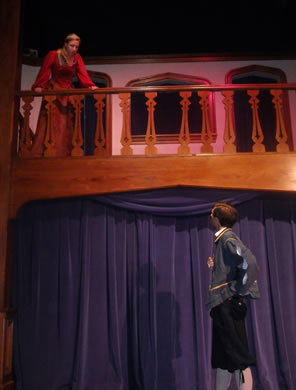The Two Gentlemen of Verona
Played off the Cuff, an Inconstant Play
Reveals Its Deeper Theme of Constancy
Baltimore Shakespeare Factory, Great Hall Theatre, St. Mary’s Community Center, Baltimore, Md.
Sunday, November 11, 2012, Second pew, front left
The Ensemble Experiment
Jessica Behar playing Julia disguised as Sebastian steps down from the stage and stands directly in front of us. Proteus, her ex-boyfriend, had just employed her to be a messenger to his new love interest, Sylvia, and Julia starts her soliloquy, “How many women would do such a message? Alas, poor Proteus.” When she gets to the line “why do I pity him,” the woman next to me says, “Good question.”

Sylvia (Kristina Szilagyi) contends with the courting Proteus (Chris Cotterman) in the Baltimore Shakespeare Factory production of The Two Gentlemen of Verona. Photo courtesy of the Baltimore Shakespeare Factory.
It’s a golden moment for Shakespearean actors and, in place (old church turned playhouse) and style (original practice), this production invites public interaction, including throwing tomatoes. However, my neighbor’s “good question” response is also perfectly apropos to this play: Why does Julia pity Proteus? It is a question Behar dives into with her performance, helped along by the Baltimore Shakespeare Factory’s “Ensemble Experiment” format in which the troupe uses Shakespeare’s original conditions of mounting the play with no director and only a few hours of rehearsal.
Just a few years ago I never would have believed I would see four productions of Two Gents in one calendar year. This year, we’ve seen a highly conceptualized tragi-comical version in a traditional theater, a concert performance of the Broadway musical in a new theater, a straightforward text-centric rendering in a replica Blackfriars playhouse, and now this original practice version in the former St. Mary’s church nave—now called the Great Hall Theatre. Two Gents also has been on many playbills this year across the spectrum of Shakespeare theaters. Is this play finally earning some long-due respect?
To me, by Shakespearean standards, The Two Gentlemen of Verona shouldn't earn much respect. No matter how many times I watch it and how earnestly it is presented, I see a young, perhaps too-cocky playwright stumbling with his craft: belabored verses, piecemeal plotting, and that wholly unsatisfying ending where Proteus tries to rape Sylvia, her betrothed and his best friend, Valentine, prevents Proteus, but upon Proteus saying “Sorry,” Valentine hands Sylvia over to him. The disguised Julia revealing herself finally stops the testosteronic stupidity.
The actors in this production said in a post-show talk-back that they spent 45 precious minutes during their limited rehearsal time debating how to stage this ending. By virtue of the production format, the onus fell on the women, Behar as Julia and Kristina Szilagyi as Sylvia, both of whom turned in strong performances, to find their way through that scene (remembering that Sylvia has zero of the final scene’s last 112 lines after Valentine steps forward). In the original practice format, actors must rely on the text unfolding as it happens and trust Shakespeare’s genius and his characters’ internal directions—even in a play as questionably crafted as Two Gents. As the company’s managing director Kelly Dowling (who plays Launce, Lucetta, and the First Outlaw) points out, “When you have longer rehearsal time, you start second-guessing your initial interpretation of the lines.”
Behar and Szilagyi therefore honed in on a key clue back in Act 4 Scene 4 when the two women meet for the first time as Julia, disguised as Sebastian, carries Proteus’ message to Sylvia. Julia hands Sylvia the wrong letter and, realizing her error, pulls it back. Sylvia asks to “look on that again.” Julia replies, “It may not be: good madam, pardon me,” and then Sylvia says, “There, hold”; just two words in this line of iambic pentameter verse . The lack of another eight syllables in the line indicates a poignant pause before Sylvia says, “I will not look upon your master’s lines” and tears up his note. In this production (as in others), that wrong letter is clearly Proteus’ original note to Julia that she, in an unfathomable state of anger, had torn to pieces; the note is now held together with blue duct tape. It’s a poignant moment in Julia’s journey, but Behar and Szilagyi found a dramatic reading of this moment for Sylvia, too: perhaps she realizes that she is in the company of someone intimately familiar with Julia, if not Julia herself. Julia, then, wonders if Sylvia has seen through the disguise and, deep down, hopes she has. The remainder of the scene has the two of them engaged in a kind of courtship dance as Sylvia asks “Sebastian” to describe Julia. The Shakespearean convention holds that a disguise is foolproof and other characters don’t see through it; Behar and Szilagyi don’t break that rule, but they do bend it to bring more dramatic urgency and a pointed subtext to their performances that pays off in the last scene.
When Valentine offers Sylvia to Proteus, Szilagyi’s Sylvia is clearly incensed and starts storming off the stage, whereupon Behar’s Julia feigns fainting to divert attention, and then she purposefully gives Proteus the wrong ring in order to reveal her true self. They are next interrupted by the arrival of the other outlaws with the Duke and Thurio, and Sylvia is suddenly faced with another pair of unpleasantries: her angry father and his choice for her husband, Thurio, laying claim to her. Valentine steps in again to prevent this and, in claiming Sylvia as his own, he reaches back for her hand. She slowly, but surely, takes his hand, and Joel Ottenheimer as Valentine look back at her with a bit of relief cracking through his bravado. It’s a gloss over Valentine’s whole “Here, dude, take her,” moment with Proteus, but this presentation keeps that moment as written while still getting us to the ultimate happy ending without stumbling.
And that is, in fact, a theme of this play, and Shakespeare's ending may be an example of form mirroring allegory—albeit, clumsily done. For the two gentlemen and the two ladies to reach their happy endings, they must overcome not just any obstacle but the great sin of man’s inconstancy. Or, in this case, the inconstancy of Proteus. The character’s arc evolves upon three uses of the word “constant,” and Chris Cotterman emphasizes all three instances. In his farewell from Julia, he offers his hand “for my true constancy.” In the central soliloquy where he decides to betray both Julia and Valentine to pursue Sylvia, he contends that he must “prove constant to myself.” Finally, after Julia has revealed herself to him, Proteus comes to his better senses with “O heaven, were man but constant, he were perfect. That one error fills him with faults; makes him run through all the sins: Inconstancy falls off ere it begins.”
You might be inclined to dismiss this as a devil-made-me-do-it excuse, but Shakespeare is in earnest here, for Proteus’s behavior is juxtaposed not just with Valentine’s but, more notably, Julia's and Sylvia’s, two women who remain constant to their men and to each other. Behar needed this understanding to find her own arc with Julia and answering that question, “Why do I pity him?” The answer is that women will fall in love with a man for all his good points and try to get past the bad points, no matter how bad those points seem to others. Even the strongest of women (think Hillary Clinton) put up with their men’s inconstancy.

The Baltimore Shakespeare Factory rents bags of tomatoes (actually stress balls decorated to look like the fruit) for audience members to throw at the actors if they forget their lines. Photo by Eric Minton.
Cotterman plays Proteus as a good man, except for his falling off the constancy wagon so easily. He does not find anything in the play that suggests Proteus to be kin to Richard III or an ancestor to Iago. Even the two pivotal soliloquies at the center of the play are written—and Cotterman speaks them—as logical thought progressions of a man trying to achieve a just end, however deluded his idea of justice may be (he’s sincerely astonished that Sylvia does not return his affections). After all, Proteus's general goodness is such that Julia is willing to disguise herself as a man and make the treacherous journey to Milan (outlaws haunt that route, remember). Furthermore, when he coaches Thurio in how to court Sylvia, Proteus’ verse is among the best in Shakespeare, and Cotterman speaks it as a thing of beauty, impressing both Chris Ryder’s Thurio and the Duke. Props, by the way, to Ian Blackwell Rogers, an entrancing actor who lifts the throw-away role of Sylvia’s father to a level of force that propels the production forward at the points where Shakespeare himself tended to let the plot drag.
In some ways, the tragedy of Proteus is his inability to hire a reliable courier service. He employs Speed to deliver his initial letter to Julia, and Speed mistakenly gives it to Julia’s maid. He uses Launce to deliver his gift of a dog to Sylvia (think toy poodle or Chihuahua), and when the little dog is stolen Launce instead tries to give Sylvia his dog, Crab (in this production played by Benson, a 4-year-old terrier–pit bull mix from the Baltimore Humane Society and available for adoption). To take his love note and ring to Sylvia, Proteus hires Julia, for goodness sake, but he doesn't realize that. Not checking references might be a greater sin than inconstancy.
That such depth in what I consider a shallow play should surface in this production is a credit to both the Baltimore Shakespeare Factory company and the manner of this production, which, if not mining the play for such meanings perhaps stumbles across them in the playing of it. Nevertheless, the Ensemble Experiment format’s true purpose is to have fun, and we got plenty of that, too. The actors engaged the audience during every soliloquy, and Dowling in particular used the audience as props in her performance of Launce. When she recounted her departure from her family, she handed her shoes, staff, and hat to members of the audience and had them perform each family member’s crying. Benson was a suitably cute and lovable Crab, but he didn’t upstage Kelly’s Launce.
As part of the Ensemble Experiment experience—and the fact that, with such short rehearsal times, the actors could easily forget their lines—audience members can rent a bag of tomatoes (actually stress balls that look like tomatoes) to throw at an actor any time they ask “line” of the prompter. Ottenheimer steels himself for a pelting when he says, per the text, that Sylvia “enjoined me to write some lines to one she loves.” No tomatoes headed his way in the performance we saw, and no actor called for a line, but the company made sure we got our tosses in by finishing out the play singing “Walk the Line.”
That Johnny Cash–penned song is about constancy. Apt and fun. That is this production of The Two Gentlemen of Verona.
Eric Minton
November 14, 2012
Comment: e-mail editorial@shakespeareances.com.
Start a discussion in the Bardroom



 Find additional Shakespeareances
Find additional Shakespeareances